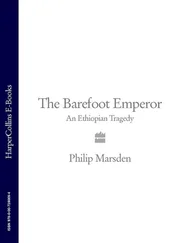‘Do you know what happened to him, Teshome, why he was detained?’
‘Do I know?’ He looked at me blankly, then nodded. ‘They said he read and distributed some anti-Derg literature.’
‘Did he?’
‘Actually he did, yes. In fact he showed it to me and I was very nearly imprisoned again as a result. It was also a time that the TPLF was advancing—so of course Tigrayans were not that popular.’
The weaver bird was still attacking its glass opponent— tap-tap…tap-tap-tap…
‘What happened in the end?’
‘They tortured him. He got gangrene in his leg—they had to amputate it. The gangrene was also in the other leg, and they had to amputate that one too. In fact, he was given permission to go home. But someone apparently said: What will people say when they see him with no legs? Much easier to kill him. They took him to a place on the edge of Addis known as “Bermuda”—the Bermuda Triangle. When people went there they nevercame back. They killed him there.
‘Mengesha was one of the best, one of the most decent individuals you could ever imagine.’ Teshome pressed his fists hard on the desk. For a moment he looked overwhelmed by his own anger. ‘That was the worst of it. They took men like that and destroyed them. Those animals. ’
I had kept an image in my mind all those years, an everyday Ethiopian image glanced from a bus window. It was of a farmer, bare-legged, his dula flexed across his shoulders, setting off on a narrow path across the plateau.
Ethiopia taught me many things. As a naïve twenty-one-year-old, with years of flunked schooling behind me, I was ready for the simplest of lessons. Instead I was presented with paradoxes. I learnt of the cruelty that could be perpetrated in the name of a good idea. I saw how a people hurtling towards catastrophe, hungry, with population growth out of control, could go on living day to day with such astonishing grace. I saw how those apparently ignored by divine goodness could still apply their greatest energy to worship. I learnt that the human spirit is more robust than life itself.
Ethiopia opened my eyes to the earth’s limitless range. I pictured the country’s startling scenes and stories multiplied across the globe, then factored up by the past. It made the notion of ‘a small world’, ‘a shrinking world’, look absurd, and it made me restless.
Ethiopia instilled in me the habit of a lifetime, the habit of travel. It revealed the rewards that can be had simply from being footloose among strangers, from taking remote and narrow paths with bare-legged farmers. It bred in me the conviction that if there is any purpose to our time on this earth, it is to understand it, to seek out its diversity, to celebrate its heroes and its wonders—in short, to witness it.
There is a saying in Ethiopia: ‘ Kes be kes inculal bekuro yihedal ‘ (’Step by step the egg starts walking’). My Amharic teacher would use it whenever I showed signs of frustration. I was a hopeless pupil; he used the expression very often. But now, after twenty-one years, the egg was hatching. I would go north into the roadless heart of the country, set off across the plateau. I would go to the places first conjured up by Teklu that afternoon in Mengistu’s stifled city, with the rain hammering on the tin roof. I would go to Lalibela, to the sacred city of Aksum, and I would walk between them.
‘Walk?’ spluttered an Ethiopian friend. ‘You can’t walk ! Foreigners don’t walk. ’
Walking was what villagers did. They walked and walked, to find grazing, to church, to market, to clinics. Until the nineteenth century wheels were unknown in the highlands. They still are in most places—no barrows, no carts; just legs and shoulders and mule-backs and the glimpse of a government or NGO’s 4×4 as it races by, leaving you coughing in its dust-wake.
I made plans. I began the Ethiopian game in which information, misinformation and pure fantasy are all cunningly dressed up as each other. With such distances, I asked, might it be better to ride? Yes, ride, ride—on a horse! No (there are no horses, not up to the terrain). Should I go alone? Yes, yes—all alone! No (suspicious villagers would march you straight into the first town). Is it safe? (Very safe, no bandits/you will need one unit of armed guards). Is there food? (No food/lots of food). The truth was that no one knew anything other than a couple of the towns on my route.
I found a tent, bought a kerosene stove and stocked up with packet soup and sardines. I tracked down a Tigrinya-speaking guide named Hiluf in Aksum; I asked him to take a bus and meet me in Lalibela. I prised a map from the appropriate government agency.
One morning, I climbed the hill to Giorgis cathedral. It was not yet eight. The crowds were flooding up past the equestrian statue of Emperor Menelik. We were pressed closer and closer together, swept forward on an unstoppable tide. The octagonal church rose from a mass of white gabbis. All around me people were in various states of rapture. Some men were dancing. Others bowed their heads. Women stood in tears. From the steps, a flop-haired hermit delivered a eulogy to the dual virginity of Mary: ‘ There is nothing that equals her glory. She is higher than all creatures, men as well as angels! Her dress is the sun with the moon beneath her feet… ‘ Amputees dragged themselves among the worshippers’ legs. A group of boys had climbed into the trees to watch. It could have been the fifteenth century, or any century.
Giorgis cathedral was the first place I ever saw the spectacle of Ethiopian worship. I had come here with Teklu on my second day in Addis. After a lifetime of sober grey churches and bloodless rite, I was astonished. Christianity to me was something dusty and ossified, but not here. Over the years, the Ethiopian Church came to distil for me all that was extraordinary and ageless about the country. After my first visit, I thought you only had to step out over the threshold of Europe to be faced with such a sight. Now I know that that is only partly true. There is nowhere else on earth quite like Ethiopia.
The next morning, with 130 pounds of equipment and food, I flew to Lalibela.
An hour before dawn and Lalibela’s rock-cut trenches are dark as oil. Their high sides rise to a narrow strip of stars. Underfoot the tufa is rough and pitted. I steady myself with a hand on the cold walls. The night air is sharp against my nostrils. Along the tunnel from the church of Debra Sina comes the nasal sound of chanting. Each phrase lasts a minute. Then— boooom !—the first beat of the kebbero. It is a sound like no other. It strikes you somewhere deep in the thorax. Another beat, and I quicken my pace.
Far below ground level, the base of the church rises from its own plinth of bedrock. Sandals are heaped by the door. Light glows from keel-arch windows. Inside is warmth, the smell of an all-night presence. Dozens of people are wrapped in white gabbis. Some are no more than shapes on the floor; others are standing heron-still around the central bay. On sturdy columns can be seen the chisel-cuts in the rock. The columns rise to shallow cupolas. Far beneath them two drummers squat beside their kebberos. Slowly, alternately, with the flat of their hands, they are beating the goatskin tympana.
The debtara are standing over them. They are elongated figures in white turbans and hanging white shawls. They are chanting. The drums beat, the debtara drop their wrists and their handheld sistra rattle like coins.
One of the drummers gives a quick, double bo-boom ! The other follows. The tempo increases. One by one the shapes rise from the floor. In two lines the debtara shuffle towards each other. Their prayer sticks cluster above them. At the exact moment they begin the dance, a blind cantor steps to the front, his mouth open in song. He is wearing a pair of women’s dark glasses. The drummers are standing now. Each kebbero hangs from a shoulder-strap. They circle each other. They give two more double beats. Rhythmic clapping spreads through the church. One of the drummers leans to the right, the other to the left. Now they are spinning. They are crouching, rising. Their faces glow with abandon. The people press closer around them. The cupolas fill with ululations. The drummers’ eyes flash in the half-light. The debtara are swinging the prayer sticks now, surrounding the drummers in their ecstasy of beating. A young boy joins their line, his head level with the men’s hips. He is imitating their movements.
Читать дальше











